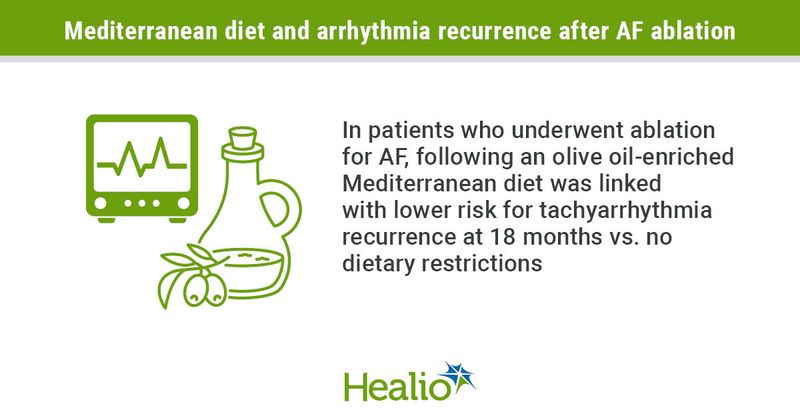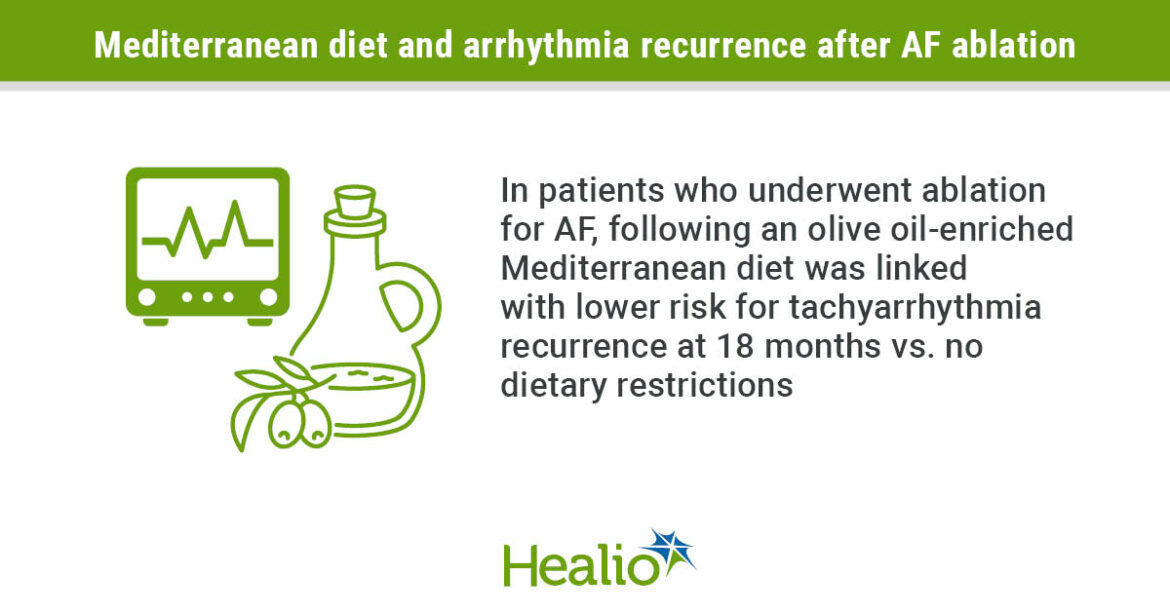Add topic to email alerts
Receive an email when new articles are posted on
Please provide your email address to receive an email when new articles are posted on .
“
data-action=”subscribe”>
Subscribe
We were unable to process your request. Please try again later. If you continue to have this issue please contact customerservice@slackinc.com.
Back to Healio
Key takeaways:
In patients who had ablation for atrial fibrillation, following a Mediterranean diet reduced risk for arrhythmia recurrence at 18 months.
The risk difference was greatest for patients with paroxysmal AF.
In patients with atrial fibrillation who had ablation, those assigned a Mediterranean diet enriched with extra-virgin olive oil were less likely to have arrhythmia recurrence than those with no dietary restrictions, researchers reported.
The difference was most pronounced for patients with paroxysmal AF at baseline, according to the results of the PREDIMAR trial presented at Heart Rhythm 2024.

Data were derived from Barrio-Lopez MT, et al. Late-breaking clinical trials and science – ablation. Presented at: Heart Rhythm 2024; May 16-19, 2024; Boston.
“Patients frequently ask me about what diet and lifestyle changes are most impactful after being diagnosed with atrial fibrillation or following an ablation,” Maria Teresa Barrio-Lopez, MD, PhD, cardiologist at University Hospital HM Montepríncipe in Madrid, said in a press release. “Seeing the results of the PREDIMAR trial, I feel confident in recommending the Mediterranean diet enriched with extra-virgin olive oil to patients to help reduce the risk of recurrences.”
Barrio-Lopez and colleagues randomly assigned 720 patients with paroxysmal or persistent AF who underwent ablation (mean age, 60 years; 24% women) to follow a Mediterranean diet enriched with extra-virgin olive oil after their procedure or to no dietary restrictions. The intervention group received information on how to follow a Mediterranean diet with extra-virgin olive oil for free.
“The Mediterranean diet enriched with extra-virgin olive oil has been observed to have benefits in several diseases,” Barrio-Lopez told Healio. “We were hoping to know if adhering to this diet could reduce the recurrences of atrial tachyarrhythmias after an atrial fibrillation ablation.”
Patients were followed for 18 months and once per week, they used an ECG recording device. They wore a 24-hour Holter monitor at 6, 12 and 18 months.
In the overall cohort, the rate of the primary outcome of tachyarrhythmia recurrence at 18 months was lower in the Mediterranean diet group, but the difference did not reach statistical significance (24.4 per 1,000 person-months vs. 28.6 per 1,000 person-months; risk difference, –4.3 per 1,000 person-months; 95% CI, –10.7 to 2.2; adjusted HR = 0.86; 95% CI, 0.68-1.1), Barrio-Lopez said during a presentation.
Among the 431 patients with paroxysmal AF at baseline, the Mediterranean diet reduced risk for the primary outcome by 32% compared with no dietary restrictions (16.6 per 1,000 person-months vs. 25 per 1,000 person-months; risk difference, –8.3 per 1,000 person-months; 95% CI, –15 to –1.1; aHR = 0.68; 95% CI, 0.48-0.97), she said.
“We should recommend a Mediterranean diet enriched with extra-virgin olive oil to patients with paroxysmal atrial fibrillation that have been treated with an ablation to avoid or to reduce the recurrences after the procedure,” Barrio-Lopez told Healio.
Editor’s Note: This article was updated on May 23, 2024 to correct that the incidence rates were calculated in terms of person-months. The Editors regret the error.
Reference:
For more information:
Maria Teresa Barrio-Lopez, MD, PhD, can be reached at terebarriol@gmail.com.
Perspective
Back to Top

The most important take-home message is that you can do a dietary intervention study in a patient population with AF. This is not an easy thing to do, and the researchers pulled it off, using a novel way of doing dietary counseling remotely. This gives us a roadmap for how we could do these trials in the future.
The overall result of the trial appears to be null. There appears to be a benefit in the group of patients who had paroxysmal AF, but this was not prespecified. The overall result is what we need to go on. It is promising that implementing a Mediterranean diet supplemented with olive oil might reduce recurrences of atrial arrhythmias in the paroxysmal AF population, but without this trial being designed to test that specifically, it’s hard to be conclusive about that.
Of note, the endpoint was time to any atrial arrhythmia over 100 bpm. We are more concerned about recurrence of AF and the burden of AF. The researchers picked an endpoint that was perfectly reasonable at the time the trial started, but now, the field is moving more toward understanding about burden and quality of life and amount of AF, rather than just a single recurrence of something that lasts 30 seconds. A future trial might be powered and designed to look at a more specific endpoint such as recurrent AF or AF burden.
The issue with the Mediterranean diet is that it doesn’t really impact weight. This has been shown in other trials. But weight reduction is important for ablation-related outcomes and particularly for obese individuals. Mediterranean diets that are specifically calorie-restricted so that you can lose weight and have the benefits of the Mediterranean diet are what should be studied next. Also, Mediterranean diets include alcohol, but alcohol restriction is known to reduce recurrences of AF. There are competing messages in this diet vs. what we are already recommending to our patients who have AF and may be undergoing ablation, which is to lose weight and minimize alcohol intake. A diet that incorporates those two principles plus the Mediterranean piece would be ideal, and maybe that could be tested in an AF population.
Christine M. Albert, MD, MPH, FHRS, FACC
Chair, Department of Cardiology
Lee and Harold Kapelovitz Distinguished Chair in Cardiology
Smidt Heart Institute at Cedars-Sinai
Past President, Heart Rhythm Society
Disclosures: Albert reports no relevant financial disclosures.
Published by:
Sources/Disclosures
Collapse
Source:
Barrio-Lopez MT, et al. Late-breaking clinical trials and science – ablation. Presented at: Heart Rhythm 2024; May 16-19, 2024; Boston.
Disclosures:
Barrio-Lopez reports no relevant financial disclosures.
Add topic to email alerts
Receive an email when new articles are posted on
Please provide your email address to receive an email when new articles are posted on .
“
data-action=”subscribe”>
Subscribe
We were unable to process your request. Please try again later. If you continue to have this issue please contact customerservice@slackinc.com.
Back to Healio

